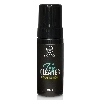How to do your intimate hygiene after sex
Publicado: 2023-06-07 15:11:31
Categorias:

Most of the time, you don't need to do anything after sex. There is no way around this. Between kissing, sweating, and the other bodily fluids that appear during intercourse or intercourse, sex is an inherently messy process. And the chances of you, your partner and your bed (or wherever you decide to have sex) get anything from stains to watermarks are high.
After sex, your first thought might be to immediately jump out of bed to clean things up – especially yourself. But it turns out that this is not entirely true. For the most basic intercourse, multi-certified sex educator Anne Hodder says, "There are no medical reasons that I know of why anyone would need a special hygiene routine for after sex."
Of course, this also depends on what happens during sex, your hygiene preferences and risk of infection. So while there appears to be no pressing medical reason to shower after sex, it's still good to have a post-play protocol in mind. Here are the most important post-sex hygiene questions answered:
How should I clean my intimate areas after sex?
When it comes to cleaning the vagina, there is no such thing. The vagina is perfectly capable of cleaning itself after sex – even if there is sperm inside. Also, trying to take matters into your own hands can actually do more harm than good. “Never… [use] products that claim to ‘clean’ the vagina or vulva, especially without douching!” says Hodder. "The vagina is a beautiful biological machine and there is absolutely no reason to interrupt the process (or the microbiome inside the vagina) with soaps, sprays or other products."
Just rinse the vulva and let the vagina handle the cleaning itself. But if stains bother you, keep unscented wipes handy. Or keep a towel nearby and tuck it under you before things get too hot in bed. Avoid relying on the top sheet as fluids can be absorbed. That said, if you're a person prone to irritation, urinary tract infections (UTIs) or yeast infections and cleaning up after sex will give you peace of mind, a gentle rinse is fine.
Do you need to pee immediately after sex?
If a shower seems like a lot of work (which after a good sex session it can be!), peeing can work as another way to help lessen the chances of a vaginal infection or UTIs. Although studies on this method are scarce or show significant evidence, many people swear by this tactic.
The theory is that as your body gets rid of fluids, any bacteria that may have been introduced into the urethra during sex may also be shed. It's okay to pee after sex, especially if it calms your mind. Still, you don't have to run to pee once you're done. “You can take a few minutes to enjoy the post-sex glow,” says Hodder.
As long as you pee within a reasonable amount of time (there's no set limit, but 30 minutes is a fair estimate), you and your urethra should be fine. Pro tip: Keep a glass of water by your bed. Drink before, during or after sex, whenever your body needs it. This can help you pee after sex.
What about after anal sex?
Anal sex can cause microscopic tears in the sphincter. And if bacteria from your anus (including fecal matter) get into these tears, it can cause an infection. If you've had anal sex, make sure you shower afterwards. Also wash the genital area to get rid of any remaining bacteria.
For people with a penis that have a foreskin, be sure to pull the skin back so you can clean the entire head of the penis. It is common for semen to dry out under the skin or for bacteria to become trapped in it. For people with clitoris, gently pull the vaginal folds and lift the clitoral hood towards the navel to clean. Use warm water and a mild soap or baby wipes. It is best not to put shower gel in the vaginal area.
How to properly clean sex toys?
If you and your partner use sex toys, be sure to clean them after sex. This will not only remove all the bacteria and ensure they are ready for the next ride, but also ensure they stay in top shape. But how exactly to clean them?
"Each sex toy will have specific instructions, depending on what material it's made of and whether or not it has a motor or batteries," says Hodder. Platinum-cured silicone products (without motors) can be boiled or placed in the dishwasher for cleaning. Products labeled 100% waterproof can be washed with liquid antibacterial soap and warm water. Splashproof products can be cleaned in the same way, but be sure not to submerge them.
What if the sex toy doesn't come with cleaning instructions?
Any product you are unsure about or does not have cleaning instructions on the label, you should wash the part of the product that came in contact with body fluids or skin with liquid antibacterial soap or toy cleaners.







